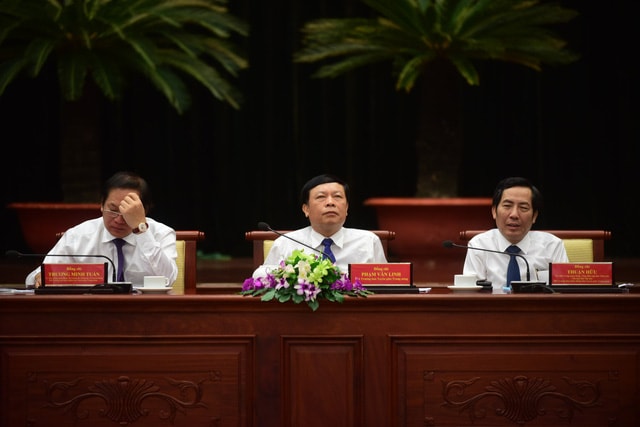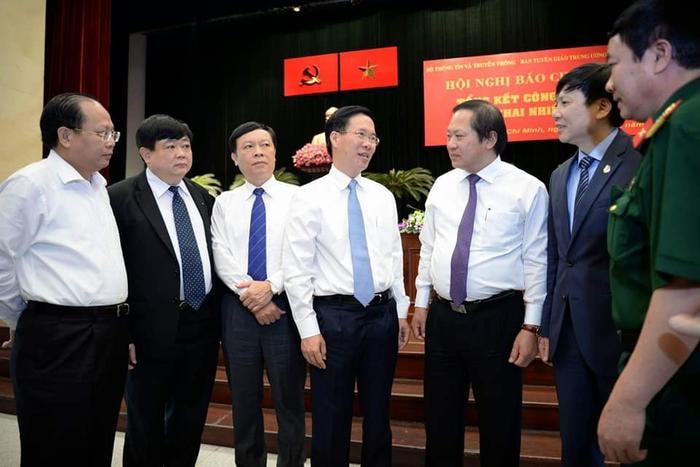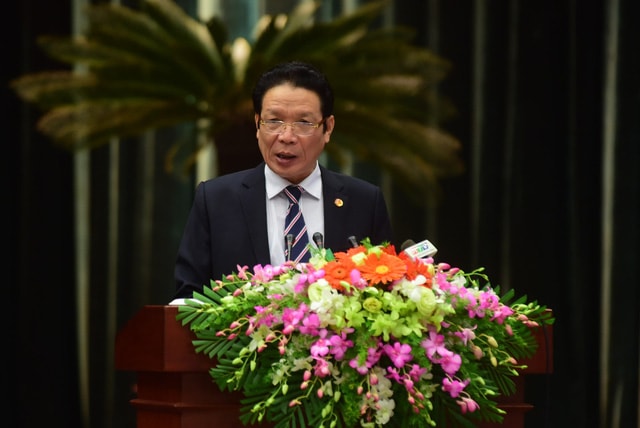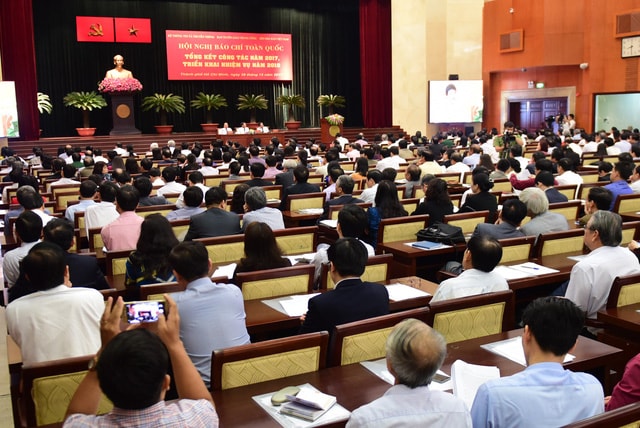Opening of the 2017 National Press Conference
(Baonghean.vn) - On the morning of December 26, in Ho Chi Minh City, the National Press Conference took place, summarizing the work of 2017 and deploying tasks for 2018. The conference had more than 650 delegates from Party, State, National Assembly, Government, Vietnam Fatherland Front agencies, press management and direction agencies, governing bodies, and press agencies attending.
Attending and directing the Conference were Comrade Vo Van Thuong - Politburo member, Secretary of the Party Central Committee, Head of the Party Central Committee's Propaganda and Education Commission; Party Central Committee members: Truong Minh Tuan - Minister of Information and Communications; Nguyen Thuan Huu - Deputy Head of the Central Propaganda and Education Commission, President of the Vietnam Journalists Association, Editor-in-Chief of Nhan Dan Newspaper; Nguyen The Ky - General Director of the Voice of Vietnam; leaders of central and local press agencies.
The Nghe An delegation attending the conference included: Representatives of the Provincial Party Committee's Propaganda Department, Department of Information and Communications, Provincial Journalists Association, Nghe An Newspaper, Nghe An Radio and Television Station.
 |
| Comrades chaired the National Press Conference on the morning of December 26, 2017. Photo: Tuoi Tre |
According to the conference organizers' assessment, in 2017, the press basically adhered to the goal of maintaining political stability, consolidating and strengthening unity of will within the Party, social consensus and people's trust in the Party, contributing to creating spiritual motivation to carry out socio-economic, national defense and security, and foreign affairs tasks.
Presenting a report at the conference, Deputy Minister of Information and Communications Hoang Vinh Bao acknowledged that the press has increasingly effectively performed its functions of monitoring and social criticism, resolutely fighting against corruption, waste, bureaucracy, and negative behavior.
 |
| Delegates exchange on the sidelines of the National Press Conference. Photo: Nguyen The Nhat Phong |
Along with that, we must actively discover and encourage new factors, advanced models, and achievements in the renovation process; actively fight to protect sovereignty, oppose peaceful evolution, and refute wrong viewpoints...
"In particular, the press has strongly participated in the fight against bad and toxic information and refuted wrong views on the internet environment," said Mr. Hoang Vinh Bao. "Many press agencies have innovated, accessed modern journalism technology, invested in improving the quality of articles and programs..."
 |
| Deputy Minister Hoang Vinh Bao speaks at the Conference. Photo: Tuoi Tre |
At the Conference, Deputy Minister Hoang Vinh Bao analyzed 10 shortcomings and limitations.
One isInformation that is not in line with the principles and purposes of the license, exploiting and disseminating negative issues, one-way information, causing frustration for localities, businesses and individuals.
Two isInformation that is untrue, politically insensitive, not in line with the interests of the country and people, not in line with orientation, and reveals state secrets.
Three istoo much information about the dark side of society
Four isThe work is still careless, lacking, lax, and the content of comments is not completely controlled. Some journalists take advantage of social networks to express opinions that go against the newspaper's views.
Five isInformation in the press on many important issues is slower than on social networks.
Six is vadvertising violations
Seven isintellectual property and copyright violations.
Eight isThe situation of "gang beating", sentencing cases and phenomena without considering legal regulations, the situation of "presumption of guilt" causes great damage to individuals and organizations.
Nine isviolations by some representative offices and resident reporters. In many cases, reporters only pry into and look for loopholes in businesses and localities to put pressure with unhealthy motives. There are even cases of forming "press alliances" to harass and extort businesses, forcing them to sign advertising and media contracts, or arbitrarily removing or editing articles.
Ten isThe increasing trend of "newspaperization" of electronic magazines and electronic information sites, which is not in accordance with the licensed principles and purposes.
 |
| Delegates attending the Conference. Photo: Tuoi Tre |
Deputy Minister Hoang Vinh Bao also warned of two issues that arise in current journalism activities. That is, the development of social media makes information on social networks fast, rich, diverse, multi-dimensional, easy to report and share, creating a powerful force of news reporters.
"Social networks are at risk of dominating and overwhelming the press in terms of information. The press is also at risk of depending on and being led by social networks with fake news, and at risk of depending entirely on social networks to increase traffic," said the deputy minister.
Regarding the press economy, the issue is the decline in advertising revenue, online advertising revenue shifting strongly to cross-border platforms such as Google and Facebook, which dominate about 66% of the online advertising market share in Vietnam.
Failure to attract advertising and control operating costs can lead to distortions in objectives and goals, affecting content quality, according to Deputy Minister Hoang Vinh Bao.
"Therefore, it can be foreseen that many press agencies will find it difficult to achieve the goal of being self-sufficient in regular expenditure by 2020 in the spirit of the project on National Press Development and Management Planning by 2025. Meanwhile, the role of the state in regulating the press economy is still weak," said the Deputy Minister of Information and Communications.
Currently, the country has 849 print newspapers and magazines, including 185 newspapers and 664 magazines. There are 195 licensed electronic press agencies. There are 178 licenses to establish general electronic information websites. The country also has 67 radio and television stations. As of November 2017, the country has more than 18,000 licensed journalists.
PV (synthesis)
| RELATED NEWS |
|---|
